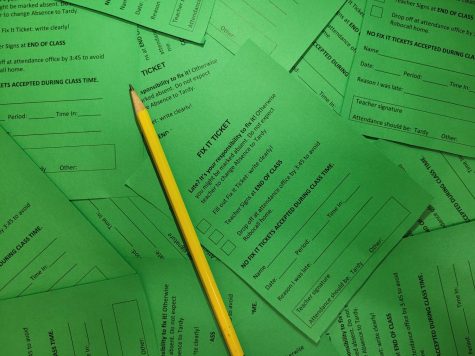CHS Administration Issues Fix-It Tickets For Student Attendance
October 25, 2022
In a process beginning last year, Capital High School administration has introduced an attendance policy called “fix-it” tickets. These tickets have been explained to help boost student attendance and allow students to develop agency in arriving to class.
Over the course of the Covid-19 pandemic, students experienced various changes to school policies such as closed campuses and school lunches. Because students have expressed confusion about how the fix-it tickets work and the ultimate goal for this new attendance system, this article is meant to shed light on this process. Staff and students are integral to our CHS community; investigating how policies are received is essential to recognizing areas of improvement and maintaining success.

The fix-it ticket policy was originally enacted during the 2021-2022 school year with the input of a committee of five students and leadership classes. CHS attendance secretary, Rebekah Grods, explained the process, “If you’re late to class your teacher signs the pass and then you bring it to attendance.” She further added that, “It corrects tardies, absences, and helps prevent phone calls home.” Grods calls it a “good sign” that its usage has lessened since the beginning of the school year.
However, many students and teachers have their own opinions on the new attendance system. One CHS teacher described that they’d almost never used the tickets. Since the tickets require teachers to fill them out, they added that, “It puts more responsibility on teachers”. However, teachers have the option to change the attendance during class as they have done previously. They explained that the fix-it tickets, “Could give kids a way out” and further added that they preferred the old method of attendance, using the tardy kiosk.
Adia Waters, 12, also had similar sentiments. “I don’t think [the tickets] worth the time, there are more valuable ways to teach students accountability.” One of the biggest issues Waters discussed was surrounding student input in the policy’s creation. Waters described that if there had been more outreach to students, the policy’s reception could have been more positive. When asked about whether she preferred the new policy over the old one, Waters gave an insightful review stating, “I’m kinda in between. I think the first policy needed some adjustments. But the new policy puts more pressure on teachers and doesn’t accommodate students’ circumstances.”
Could there be any changes to the fix-it tickets for the next school year? CHS journalism teacher, Ms. Street clarified that the policy put in place will remain. She explained that the process is working in getting students to class. She went on to say, “Perhaps mostly what students are reacting to are the other safety changes that are happening from the start of the year in addition to this one. And more accurately what students are feeling is an adjustment. It’s good practice to stay flexible and learn new things, as when students leave school they will experience nothing but change.”
Overall, it seems that many find the policy to be well-intentioned, but each has varying perspectives on its impact. However, it’s safe to say that our school community wants all policy decisions to positively serve our staff and students.
